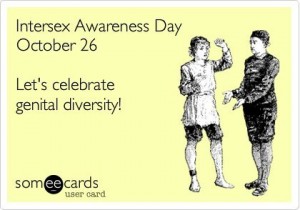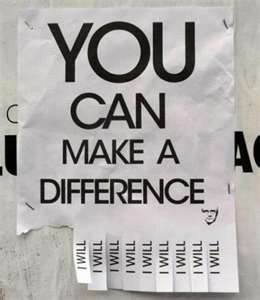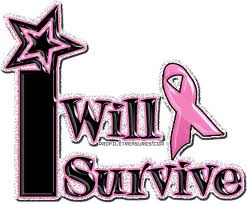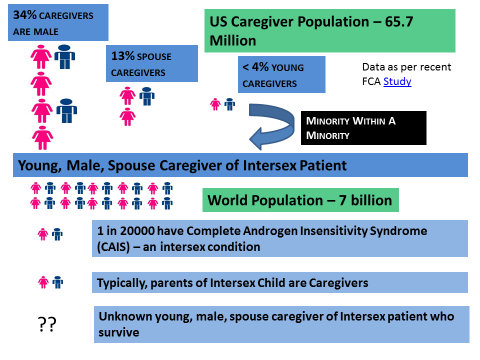 Being a young, male, spouse caregiver of an intersex patient is rare. There is also a lot of secrecy and stigma associated with it. While any one of the individual categories of being a young caregiver or a male caregiver or a spouse caregiver is celebrated, it seems because of the medical condition of intersex, being a young, male, spouse caregiver of intersex has “stigma” or “intimidation” or “hate” associated with it. So what is the message? One should NOT be in a relationship with an intersex spouse? The intent here is to educate and spread awareness and help other young caregivers or male caregivers or spouse caregivers or intersex caregivers and have a community to share with. Being older has benefits. More exposure in life and how the world works for good or bad. How would one approach caregiving differently at 40 years of age Vs. 30 years of age?
Being a young, male, spouse caregiver of an intersex patient is rare. There is also a lot of secrecy and stigma associated with it. While any one of the individual categories of being a young caregiver or a male caregiver or a spouse caregiver is celebrated, it seems because of the medical condition of intersex, being a young, male, spouse caregiver of intersex has “stigma” or “intimidation” or “hate” associated with it. So what is the message? One should NOT be in a relationship with an intersex spouse? The intent here is to educate and spread awareness and help other young caregivers or male caregivers or spouse caregivers or intersex caregivers and have a community to share with. Being older has benefits. More exposure in life and how the world works for good or bad. How would one approach caregiving differently at 40 years of age Vs. 30 years of age?
1) Medical Science – Do not believe everything they say. While the doctors are very intelligent and smart people, they are also humans just like their patients and caregivers and may have biases. Rather than treating them as an authority figure, seek their knowledge. Understand that some, not all, doctors may have vested interests in a medical condition which are contradictory to you as a caregiver. Caregivers of Alzheimer’s from 1970s and 1980s can attest to this.
2) Bioethics – If the medical community sites “privacy” to hide the truth about the medical treatment of your spouse, report it to the hospital administrator. Seek to speak to a medical counselor who is advocating for caregiver rights. As a spouse, you have the right to know the truth just as much as the patient, your spouse.
3) Medical Records – If the medical community chooses to deliberately falsify a medical record, report it to the hospital administrator. If the medical procedure is valid then why hide/falsify it?
4) Insurance fraud – If your insurance is paying for your spouse’s medical treatment, get proper medical records. You could be held liable for insurance fraud along with the hospital and doctors for them falsifying medical records.
5) Sharing – Despite the level of trauma and secrecy, it is OK to share the facts of the medical condition and its effects on you with a confidant. It is not being dishonest or disrespectful to your patient spouse. You as a caregiver also have needs which can only be dealt with if the truth is known. Having a healthy support group and caregiver respite are important especially when dealing with a traumatic medical condition.
6) Young caregiver or Male caregiver or Spouse caregiver – If you fit into either one of these categories, you are a minority. Like other minorities, you will have to fight and demand for your rights. You have a choice to either care for your loved one AND fight for your rights as a caregiver or leave your loved one.
7) Children – Wait till the trauma of the medical condition and treatment has subsided before having children. At 30, you are hopeful and immature and in a hurry to have children without realizing the severity and trauma of the medical treatment.
8) Infertility – If after you have dealt with the medical treatment and then have to deal with infertility, understand the laws about infertility first. If you are an international infertile couple, understand the applicable laws first.
9) Trailblazing – In 2014, infertility laws especially when it comes to treatments like in vitro fertilization (IVF) are LACKING and there is not enough precedence. Especially, if you are dealing with IVF/surrogacy across international boundaries and then immigration laws come into play. Most countries require a “biological link” with the child to be allowed into the country if the child is born outside the country. In medical treatments like in vitro fertilization (IVF) with availability of anonymous sperm donor, egg donor, and surrogate womb, establishing biological link with the child is VERY CRITICAL. Do NOT falsify records, you are hurting the innocent child’s future.
10) Compassion – Understand that while a caregiver or a fertile spouse in an infertile relationship shows a lot of compassion by NOT leaving the relationship in sickness and in health, NO ONE CARES. You have to look out for yourself regardless of all the “sensitivity noise” in the community. As a young caregiver, you have the rest of your life to live. Do not fall victim to the system’s inefficiencies and make it a traumatic life for you. You have a great future ahead!!!!















 Facebook
Facebook GooglePlus
GooglePlus RSS
RSS Twitter
Twitter